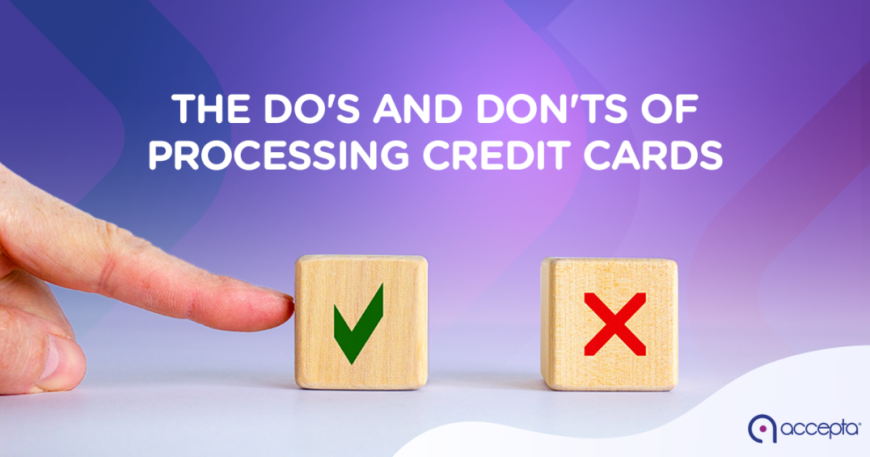PRE-SETUP DO’S
- Do research credit card processing solutions to gain understanding of how merchant services work. This includes research for specific business types, such as retail, e-commerce, and B2B. We offer resources on our website to help you get started.
- Do your initial research several months (at least 1 or 2) ahead of time, and complete your processing solution setup or installation phase at least two weeks before processing your first card.
- Do research on what downgrade fees are and why they may account for 50% of your bill.
- Do become PCI compliant regardless of the size of your business. PCI compliance will ensure the safety of customer data and increase your business’ reputation.
- Do find a payment processing company that will answer all your questions and ask questions back. The more they understand your business, the better they can help you get the solutions you actually need.
- Do setup a large ticket merchant account if you have transaction amounts of approximately $6,000 and up.
- Do accept all card brands. Accepting Discover and Amex cards isn’t as complicated as it used to be, and Amex is important for B2B since it can make up over 50% of transactions.
- Do setup the right merchant account type for your business: retail, e-commerce, B2B, etc. Some options may cost more if you don’t accept cards correctly for your account type.
PRE-SETUP DON’TS:
- Don’t assume your local bank has the best offer simply because you are already their customer.
- Don’t accept the lowest offer without considering factors like security, service and reliability. Processing through a dishonorable company can harm your business.
- Don’t acceptbundled, pass-through, ERR, or EBB rates unless you fully understand what’s being offered, and are certain that it meets your needs.
- Don’t confuse debit rates and credit rates. Anything below 1.6% is either a debit rate or will be charged elsewhere.
- Don’t sign an equipment lease unless you are aware of the difference in cost versus purchasing and are completely sure about your decision.
- Don’t get caught off guard by your contract’s fine print. Only work with a processing company willing to be transparent and explain everything clearly.
POST-SETUP DO’S:
- Do inspect your bank account frequently for the first months to make sure your money is being deposited correctly.
- Do read through your statements each month to make sure you are being charged what you were expecting. Again, be sure to understand what downgrade fees and surcharges are ahead of time. You can read more about downgrade fees here.
- Do check your customers’ IDs and make sure the card is theirs. You’re liable if you accept a stolen card.
- Do control and monitor returns carefully. And most importantly, do respond to chargebacks, and retrieval requests immediately.
- Do have security measures in place. Since you’re liable for accepting a stolen card, be sure to check customer IDs and have multiple verification options.
- Do contact your processing company if you need to process a transaction that greatly exceeds the average amount. For example, processing $10,000 when your average ticket is $100.
POST-SETUP DON’TS:
- Don’t refund a credit card payment as cash or check, only to the card that was used in the transaction. Refunding the customer in cash will not avoid them making a chargeback, which will result in a double loss for your business.
- Don’t try processing your personal credit card through your own merchant account.
- Don’t process payments for other businesses or individual person, this may be considered as fraud or money laundering and is specifically prohibited by card companies.
- Don’t set minimum purchase amounts to accept credit card payments.
- Don’t charge service fees for credit card payments, you can only discount for purchasing in cash.
- Don’t let anyone reprogram your terminals unless you know they work for your processor.
LONG TERM DO’S:
- Do spread the word about your processor if you are satisfied with the service you’ve received. You might receive an incentive for your referrals, and you would be doing your friends a favor.
- Do maintain PCI compliance requirements up to date. It is a card brand requirement and if you suffer a data breach while non-compliant, it can cost you a lot of money.
- Do provide at least a month’s notice if you intend to close your merchant account. This way you can make sure all transactions are cleared.
LONG TERM DON’TS:
- Don’t wait to contact your processor company if you are encountering problems or are unhappy with the service you’re receiving.
- Don’t leave unpaid your final bill with your processor. Failing to do so causes future problems, which can include being put on banned merchant lists.
E-COMMERCE DO’S:
- Do use an API integration method and SSL to better accept payments on your website.
- Do check transactions’ AVS and CVV to determine their validity.
E-COMMERCE DON’TS:
- Don’t limit your customers. Offer additional payment methods for them.
- Don’t keep customer credit card information unless it’s encrypted and secure per PCI regulations.
For more information about secure payment processing solutions, contact us at (787) 774-1555 or visit us at www.acceptapayments.com.





